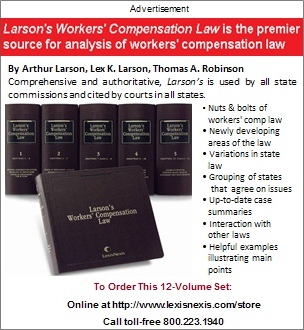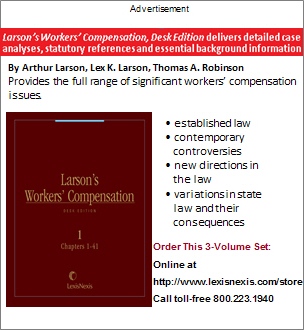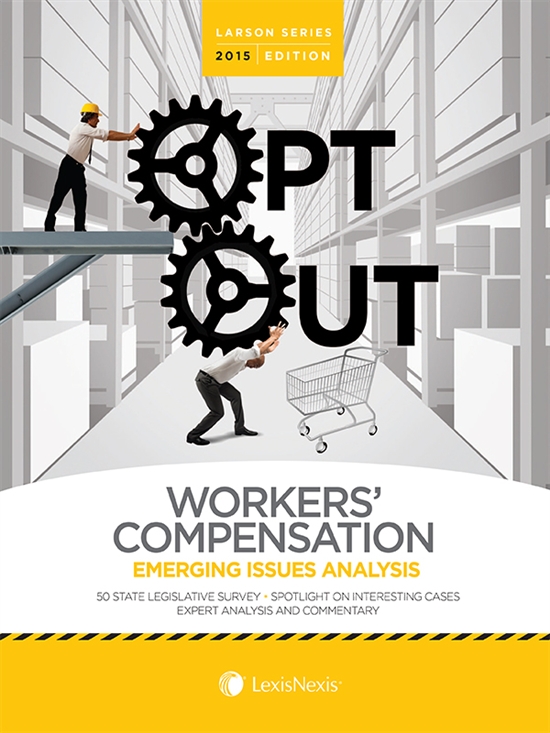© Copyright 2016 LexisNexis. All rights reserved. This article is excerpted from Larson’s Workers’ Compensation Law, Ch. 84.
Sometimes the causal problem of disability is further complicated by adding to medical and economic factors the further element of voluntary conduct on the part of the claimant contributing to the unemployment. This conduct usually takes the form of misbehavior leading to discharge or demotion, or of voluntary quitting.
Discharge for Misconduct
If the record shows no more than that the employee, having resumed regular employment after the injury, was fired for misconduct,[n.1] such as a violation of the employer's drug-free workplace rules,[n.1.1] failure to document the employee's absence from work,[n.1.2] reporting to work with a blood alcohol level well above the legal limit,[n.1.3] with the impairment playing no part in the discharge, it will not support a finding of compensable disability. But if to this record there is added evidence that the claimant has been hampered by the impairment in obtaining or holding other employment, the question is not quite so one-sided.[n.2] A good example of the problem is provided by Ucci v. Hathaway Bakeries, Incorporated.[n.3] Claimant, a route supervisor for a bakery, sustained a back injury that disabled him for work involving lifting. He received compensation for several months, and then was able to resume his duties as a supervisor. Not long after, he was demoted for fighting, but, since the demotion reduced him to the job of a driver salesperson, and since the duties of a driver salesperson included carrying boxes of bakery goods which claimant contended he was unable to handle, claimant quit. His subsequent efforts to obtain employment in a hardware store, in a plumbing shop, and elsewhere were unsuccessful because of his physical condition. He got one job in a printing shop, but had to give it up after two days because of his back trouble. Compensation was denied.
Here we have a worker who has, by resuming his old job, proved that he is not incapacitated for the very duties in which he received his injury. He loses that job for independent reasons, and thereafter finds his physical disability a bar to the only kinds of employment available. The medical testimony was that claimant was partially disabled, but could engage in a sedentary occupation. Yet the combination of undisputed medical testimony of partial disability plus present inability to get a job solely because of physical condition does not add up to compensable disability, since claimant through his own fault lost a job for which he was concededly fitted. It is true that claimant's successful return to his regular job is logically an almost insuperable obstacle to finding of disability. Perhaps the only way in which the penalty for a moment's fighting can be adjusted to something more appropriate than forfeiture of all compensation rights would be legislation comparable to those Unemployment Compensation provisions which handle discharge for misconduct and voluntary quitting by a penalty of a limited number of weeks' compensation rather than complete loss of benefits.
In another unusual case, the Court of Appeals of Utah affirmed an award of continued workers' compensation benefits to an injured worker in spite of the fact that he was terminated—after beginning a light duty program—for sending pornographic images to other employees' cell phones and on company email accounts.[n.3.1] The court agreed that there was no evidence the worker actually intended to sever his employment relationship with his employer. Nor had the worker refused light duty. The court did not find persuasive the employer's contention that light work remained available to the worker, that he had constructively declined it by his improper activities.
Still another pattern is represented by an Ohio case,[n.3.2] in which a truck driver was injured in a traffic accident for which he was cited. Because it was the driver's third such citation in one year, the employer's liability carrier dropped the driver from coverage. Without such insurance coverage, the driver could no longer fulfill his duties and so he was fired. When he sought workers' compensation benefits for his injuries, the employer contended that the driver had voluntarily abandoned his employment (by driving in such a fashion that would support the citation) and that he should, therefore, be disqualified from receiving benefits. The Industrial Commission agreed with the employer. The Supreme Court of Ohio reversed, finding that the Commission had abused its discretion in finding that a truck driver was not entitled to temporary total disability benefits. Citing an earlier decision,[n.3.3] the court held that if a claimant is injured by the same misconduct that leads to his or her termination, eligibility for temporary total disability compensation is not compromised. See also State ex rel. Tolle v. Spherion of Mid-Ohio, Inc., 2015-Ohio-3593, 2015 Ohio App. LEXIS 3496 (Sept. 3, 2015). Citing Cordell v. Pallet Cos., 2014 Ohio 5561, 2014 Ohio App. LEXIS 5374 (Dec. 18, 2014), as being factually indistinguishable, the court again concluded that the doctrine of voluntary abandonment does not bar an injured worker's entitlement to TTD compensation in a case involving a pre-injury infraction—here, marijuana use—undetected until after injury, where there was no showing that the employee's use of marijuana adversely affected her judgment. Tolle's arm was crushed when her supervisor hit a wrong button while she was loading a braider. While at the hospital for treatment for the injury, a post-injury drug screen resulted in a positive test for marijuana. The employer terminated Tolle because her positive test for marijuana was a violation of company policy.
Voluntary Quitting Without Misconduct
The Ucci decision was based squarely on the earlier case of Pearl v. Builders Iron Foundry,[n.3.4] which involved voluntary quitting with no element of misconduct. Claimant had returned to his previous job for three months after his injury and then had left voluntarily to take another job at better wages. Later he lost the new job and could not get another, and compensation was denied on the ground that his resumption of his regular duties had conclusively demonstrated the absence of disability.[n.3.5]
Note that, in this instance, the claimant quit his former job for reasons having nothing to do with the injury.[n.4] It goes without saying that if claimant quits because of inability to continue to perform the former duties,[n.5] or a fortiori because of doctor's orders requiring him or her to seek lighter work,[n.6] the quitting forms no impediment to a finding of compensable disability.
The number and variety of reasons for quitting are almost unlimited, but the issue remains the same: was the disability in any significant degree a factor in the decision to resign? The motive may be merely to get a better job,[n.7] or a job believed to have more security.[n.8] It may involve a change of residence.[n.9] Or it may have something to do with family or marital status.[n.10]
For example, in Burge v. District of Columbia Dept. of Employment Servs.,[n.10.1] a professional basketball player in the Women's National Basketball Association who sustained an injury during a game, who made her team the following season, but was released for "qualitative" reasons, who was thereafter offered contracts to play basketball abroad, and who then pursued a career in sports broadcasting to spend time with her fiancé was properly denied workers' compensation benefits when she later sought them; her actions constituted an abandonment of her career as a basketball player. The player's wage loss was not the result of her original injury; the court found that the player had made a clear-cut decision to end her career and seek another type of employment.
In some cases, there is a question whether the claimant has not withdrawn from the labor force altogether,[n.11] as by devoting full time to obtaining an education,[n.12] or by pursuing personal projects,[n.12.1] or by electing to retire,[n.13] or by being subject to deportation because of improper immigration documentation,[n.13.1] or by being incarcerated,[n.13.2] or by placing too many unreasonable conditions upon the return to work,[n.13.3] or by refusing appropriate and available light work offered by the employer,[n.13.4] or failure to take advantage of employer's retraining program,[n.13.5] or by refusing to take part in vocational rehabilitation services offered to the injured employee,[n.13.6] or by returning to family life.[n.14.] In one interesting case, Mulligan v. Workers' Compensation Board,[n.14.1] a state workers' compensation law judge retired from his position and moved into private practice. He sought an award for reduced earning benefits due to the "extremely stressful" nature of his job as judge. At the hearing on the claim, the former judge testified that his physician had urged him to "find something less stressful to do." The appellate court affirmed the state compensation board's determination that the judge's reduction in income was voluntary and unrelated to any work-related injury or condition. Observing that the judge/attorney had never indicated to his supervisor that he was retiring due to stress, had never requested any special accommodations to reduce his alleged levels of stress, and had never applied for disability retirement, the court found sufficient evidence to support the Board's findings that the reduced earnings were due to a voluntary decision on the part of the judge.
And, in a few cases, the reason for the quitting is simply not known[n.15]—in which event the result resembles that in cases with no disability involvement in the quitting.
Finally, note that an employee's voluntary retirement and removal from the work force does not necessarily disqualify a survivor from receiving workers' compensation death benefits. For example, in Hirneisen v. Champlain Cable Corp.,[n.15.1] a worker died in 2003 from lung cancer caused by occupational exposure to asbestos. He worked for the employer from 1940 until 1981, when he voluntarily retired. After retirement, he received a pension and social security retirement benefits. His surviving spouse testified that the employee retired because he was eligible for retirement and that in essence the employee had removed himself from the workplace. The employee never filed a workers' compensation claim against the employer related to his asbestos exposure. The surviving spouse sought workers' compensation death benefits. The employer contended that since the worker had voluntarily retired and withdrawn from the workplace, the spouse should not receive death benefits. The Delaware court disagreed, indicating the spouse's right to death benefits was independent from her deceased husband's claim. The spouse was required to show that the death was work-related and that she fell within one of the statutory categories related to beneficiaries. Death, the court reasoned, did not mean "death while working."
Ability to Earn Previous Wages Versus Ability to Perform Previous Duties
One difficulty with the rule in the Pearl case is that the claimant, having resumed employment, apparently must cling to the same job forever, for if he or she leaves it, even an admitted combination of medical disability and inability to get work as a result will never again entitle claimant to an award. The Massachusetts court adopted a somewhat less mechanistic approach to the complex problem of the worker who quits the job.[n.16] A stock clerk injured three fingers, and, after a period of total disability, was given a job as inventory clerk, in which his partially disabled hand was not as great a handicap as in stock work, which involved the lifting of packages. His pay at the new job was at least as great as at the old. After about a year, he heard that men were being laid off and that in view of his union seniority status he would probably be one of the next to go. He therefore quit voluntarily to take a clerical job in another plant at smaller pay. The question was whether this reduced pay could be used to establish partial disability, in conjunction, of course, with evidence that his right hand was permanently weakened. The court affirmed the Board's award of partial disability compensation.
In one important respect this case differs from the Ucci and Pearl cases, for here the claimant had never been able to resume his original job, or any job involving a comparable amount of manual exertion.[n.17] However, the court seems less impressed than the Rhode Island court by the factor of voluntary quitting for reasons not connected with the disability. Note that Bajdek did not quit because he could not do his work, nor because he might be dropped in part because of his injured hand; the prospect of losing his job was due entirely to union seniority rules added to the economic necessity of laying off a certain number of men.
The court draws a distinction between ability to earn previous wages and ability to perform previous duties. Here, by contrast with the Ucci and Pearl cases, there was no resumption of old duties to stand as evidence of claimant's ability to do his regular job. The receipt of equal wages for lighter work might temporarily prevent the showing of wage loss necessary to support a claim of disability, but if for any reason whatever the receipt of those equal wages is terminated, claimant should be able to show that he or she is in fact partially disabled, that he has never resumed regular duties, and that his or her present earning capacity is therefore reduced.
For example, in Hermon v. Pugh,[n.18] the employer gave a disabled worker a job at his old wage; but when claimant was thrown out of work by a strike[n.19] and could not get work elsewhere an award for partial disability was upheld.
The apparently contra case of Pigue v. General Motors Corporation[n.20] in Michigan must be read subject to the subsequent Michigan case of Lynch v. Briggs Manufacturing Company.[n.21] In the latter case, a steamfitter, who had fractured his knee, was on recovery given lighter work at his full former rate of pay and was not able to draw compensation while in receipt of these wages. Later, due to a non-occupational injury combining with his occupational injury, he could not perform even the light duties. The court held that compensation for his true industrial disability could be awarded. The payment of full wages for light work did not conclusively and finally settle the basic fact of disability; it merely prevented the award of benefits as long as such wages were being received. If, therefore, for any reason, whether related to the work or not, it becomes impossible for the employer to continue the payments which prevented an inquiry into actual disability, the question of disability can be reopened on the basis of the true facts bearing on the condition.
The strike case was distinguished by treating it as a case in which the claimant, by virtue of his membership in the union which called the strike, in effect placed himself in the position of refusing suitable employment that had been offered him. At the same time the court announced a general rule that the principle of the Lynch case applies whenever an employee performing "favored"[n.22] work at regular pay is prevented from continuing such work by the operation of events beyond the employee's control and not attributable to him or her.[n.23]
Mississippi employs a unique scheduled benefits rule for injured employees who are unable to perform the "substantial acts of his usual employment" following the injury. In McGowan v. Orleans Furniture, Inc.,[n.24] the state high court recognized an important distinction between functional (medical) impairment and occupational loss, holding that a maximum scheduled benefits should be awarded if the injury prevents the worker from "performing the substantial acts of his or her usual employment." In Meridian Professional Baseball Club v. Jensen,[n.25] a professional baseball player sustained a 7% functional loss to his arm following a baseball injury and contended that he was entitled to benefits for total occupational loss of a member since the injury rendered him unable to perform the "substantial acts of his usual employment" (as a professional baseball catcher). The supreme court refused to take too limited a view about the player's ability to earn an income. Noting that there was evidence that after the injury the player had worked in a variety of jobs and was actually earning more each week than at the time of his injury, the court affirmed an award based upon a 25% occupational loss of use of his arm but not for the total loss of the member.
The key, said the Jensen court, was whether "the job at the time of injury" is necessarily the "usual employment." The court answered in the negative. Where a permanent partial disability rendered the worker unable to continue in the position held at the time of the injury, there arose a rebuttable presumption of total occupational loss of the member. The presumption could, however, be overcome with proof of the workers' ability to earn wages comparable to those earned at the time of the injury.
Footnotes:
Footnote 1. Lexis Advance subscribers to Larson’s Workers’ Compensation Law can link to a list of citations arranged by jurisdiction here. To subscribe to Lexis Advance, contact Sales at 1-888-AT-LEXIS.
Footnote 1.1. Accord Pousson v. United Parcel Serv., 05-460 (La. App. 3 Cir. 12/30/05), 918 So. 2d 611. Gilmore v. Indus. Claim Appeals Office, 187 P.3d 1129 (Colo. Ct. App. 2008). State ex rel. Hisle v. Industrial Comm'n, 140 Ohio App. 3d 550, 748 N.E.2d 558 (1999), appeal dismissed, 91 Ohio St. 3d 1499, 746 N.E.2d 192 (2001). RSG Forest Prods. v. Jensen, 127 Or. App. 247, 873 P.2d 324 (1994).
Footnote 1.2. See State ex rel. Jacobs v. Indus. Comm'n of Ohio, 139 Ohio St. 3d 86, 2014-Ohio-1560, 9 N.E.3d 999 (2014).
Footnote 1.3. BJ's Wholesale Club v. Workers' Comp. Appeal Bd. (Pearson), 43 A.3d 559 (Pa. Commw. Ct. (2012).
Footnote 2. Lexis Advance subscribers to Larson’s Workers’ Compensation Law can link to a list of citations arranged by jurisdiction here. To subscribe to Lexis Advance, contact Sales at 1-888-AT-LEXIS.
Footnote 3. Ucci v. Hathaway Bakeries, Incorporated, 75 R.I. 341, 66 A.2d 433 (1949).
Footnote 3.1. Stampin' Up, Inc. v. Labor Comm'n, 2011 UT App 147, 256 P.3d 250 (2011).
Footnote 3.2. State ex rel. Haddox v. Industrial Comm'n, 135 Ohio St. 3d 307, 2013-Ohio-794, 986 N.E.2d 939 (2013).
Footnote 3.3. State ex rel. Gross v. Industrial Comm'n, 115 Ohio St.3d 249, 2007 Ohio 4916, 874 N.E.2d 1162.
Footnote 3.4. Pearl v. Builders Iron Foundry, 73 R.I. 304, 55 A.2d 282 (1947).
Footnote 3.5. Cf. Vogel v. Workforce Safety and Ins., 2005 ND 43, 693 N.W.2d 8.
Footnote 4. See Matter of the Claim of Tawil v. Fallsburg Central Sch. Dist., 106 A.D.3d 1314, 966 N.Y.S.2d 247 (3rd Dept. 2013). Lexis Advance subscribers to Larson’s Workers’ Compensation Law can link to a list of citations arranged by jurisdiction here. To subscribe to Lexis Advance, contact Sales at 1-888-AT-LEXIS.
Footnote 5. Lexis Advance subscribers to Larson’s Workers’ Compensation Law can link to a list of citations arranged by jurisdiction here. To subscribe to Lexis Advance, contact Sales at 1-888-AT-LEXIS.
Footnote 6. In the Matter of the Claim of Renteria v. Santino's Cafe, 62 A.D.3d 1233, 879 N.Y.S.2d 638 (2009).
Footnote 7. Powers v. District of Columbia Dep't of Employment Servs., 566 A.2d 1068 (D.C. 1989). Pearl v. Builders Iron Foundry, 73 R.I. 304, 55 A.2d 282 (1947). Lexis Advance subscribers to Larson’s Workers’ Compensation Law can link to a list of citations arranged by jurisdiction here. To subscribe to Lexis Advance, contact Sales at 1-888-AT-LEXIS.
Footnote 8. Meyers v. Bell Aerosys., 43 A.D.2d 869, 353 N.Y.S.2d 254 (1974).
Footnote 9. See, e.g., Gibbons v. Shaddix Pulpwood Co., 699 So. 2d 225 (Ala. Civ. App. 1997). Lexis Advance subscribers to Larson’s Workers’ Compensation Law can link to a list of citations arranged by jurisdiction here. To subscribe to Lexis Advance, contact Sales at 1-888-AT-LEXIS.
Footnote 10. Ahoe v. Quality Parks Prods., 258 N.W.2d 885 (Minn. 1977). Miller v. Pan American World Airways, 46 A.D.2d 718, 360 N.Y.S.2d 293 (1974). Vetter v. Alaska Workmen's Comp. Board, 524 P.2d 264 (Alaska 1974).
Footnote 10.1. Burge v. District of Columbia Dept. of Employment Servs., 842 A.2d 661 (D.C. 2004).
Footnote 11. Lexis Advance subscribers to Larson’s Workers’ Compensation Law can link to a list of citations arranged by jurisdiction here. To subscribe to Lexis Advance, contact Sales at 1-888-AT-LEXIS.
Footnote 12. Lexis Advance subscribers to Larson’s Workers’ Compensation Law can link to a list of citations arranged by jurisdiction here. To subscribe to Lexis Advance, contact Sales at 1-888-AT-LEXIS.
Footnote 12.1. Florentino v. Mount Sinai Med. Ctr., 126 A.D.3d 1279, 6 N.Y.S.3d 704 (3rd Dep't 2015).
Footnote 13. Lexis Advance subscribers to Larson’s Workers’ Compensation Law can link to a list of citations arranged by jurisdiction here. To subscribe to Lexis Advance, contact Sales at 1-888-AT-LEXIS.
Footnote 13.1. Reinforced Earth Co. v. Workers' Comp. App. Bd. (Astudillo), 570 Pa. 464, 810 A.2d 99 (2002).
Footnote 13.2. See, e.g.: Parker v. Union Camp Corp., 108 N.C. App. 85, 422 S.E.2d 585 (1992). Keys-Pealers, Ltd. v. Workers' Comp. App. Bd. (Bricker), 870 A.2d 936 (Pa. Commw. Ct. 2005), appeal denied, 584 Pa. 721, 887 A.2d 232 (2005).
Footnote 13.3. In the Matter of the Claim of Hester v. Homemakers Upstate Group, 82 A.D.3d 1461, 918 N.Y.S.2d 762 (3rd Dep't 2011).
Footnote 13.4. Matter of North v. New Venture Gear, 56 A.D.3d 931, 867 N.Y.S.2d 258 (3rd Dep't 2008).
Footnote 13.5. In the Matter of Kucuk v. Hickey Freeman Co., Inc., 909 N.Y.S.2d 831 (App. Div. 2010).
Footnote 13.6. State ex rel. Gibbs v. Thistledown, Inc., 2014-Ohio-2731, 2014 Ohio App. LEXIS 2678 (June 24, 2014).
Footnote 14. Vetter v. Alaska Workmen's Comp. Bd., 524 P.2d 264 (Alaska 1974).
Footnote 14.1. Mulligan v. Workers' Comp. Bd. 27 A.D.3d 848, 810 N.Y.S.2d 573 (2006).
Footnote 15. Kunigonis v. H. P. Foley, Inc., 28 Pa. Commw. 73, 367 A.2d 763 (1977).
Footnote 15.1. Hirneisen v. Champlain Cable Corp., 892 A.2d 1056 (Del. 2006).
Footnote 16. Bajdek's Case, 321 Mass. 325, 73 N.E.2d 253 (1947).
Footnote 17. The court is careful to stress this feature, and on the strength of it to distinguish Driscoll's Case, 243 Mass. 236, 137 N.E.260 (1922), and Capone's Case, 239 Mass. 331, 132 N.E.32 (1921).
Footnote 18. Hermon v. Pugh, 272 A.D 985, 72 N.Y.S.2d 834 (1947).
Footnote 19. Lasseter v. Florida Citrus Canners Coop., 118 So. 2d 215 (Fla. 1960).
Footnote 20. Pigue v. General Motors Corporation, 317 Mich. 311, 26 N.W.2d 900 (1947).
Footnote 21. Lynch v. Briggs Manufacturing Company, 329 Mich. 168, 45 N.W.2d 20 (1950).
Footnote 22. If the work is not favored work or made work, a substantial continuance in the new occupation will establish claimant's earning capacity, and if he quits the new job there will be no finding of disability based on difficulty in becoming re-employed. See Pulley v. Detroit Eng'g & Mach. Co., 378 Mich. 418, 145 N.W.2d 40 (1966).
Footnote 23. Lexis Advance subscribers to Larson’s Workers’ Compensation Law can link to a list of citations arranged by jurisdiction here. To subscribe to Lexis Advance, contact Sales at 1-888-AT-LEXIS.
Footnote 24. McGowan v. Orleans Furniture, Inc., 586 So. 2d 163, 166 (Miss. 1991).
Footnote 25. Meridian Professional Baseball Club v. Jensen, 828 So. 2d 740 (Miss. 2002).
© Copyright 2016 LexisNexis. All rights reserved. This article is excerpted from Larson’s Workers’ Compensation Law, Ch. 84.























